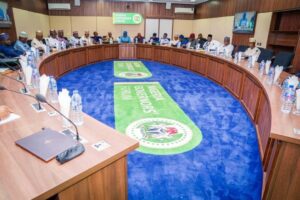
NBC restates commitment to Nigerian business environment growth
The Nigerian Bottling Company (NBC) Ltd. has assured the Minister of Industry, Trade, and Investment, Dr Doris Uzoka-Anite, of its commitment to investing in the growth of the Nigerian business environment.
This is contained in a statement by Mr Goran Sladic, the Managing Director, NBC, on Tuesday in Lagos.
Sladic gave the assurance during the Minister’s courtesy visit to its office.
He noted that the past decade had been a testament to the company’s unwavering dedication to placing consumers at the core of its operations.
Sladic said that within the last 10 years, the Coke system had made a substantial investment of $1.32 billion, enhancing operational capacity, revolutionising supply chain infrastructure, and providing extensive training to its workforce.
He said the NBC’s commitment extended beyond its products to encompass a wide range of community initiatives.
These initiatives, Sladic explained, focused on empowering women and youth, championing water stewardship, and promoting environmental sustainability and efficient waste management.
He affirmed the company’s ongoing commitment to invest in their Nigerian operations and expressed optimism that favourable business conditions would bolster their capabilities and facilitate further investments.
“Marking our 70th anniversary, we reinforced our pledge to Nigeria with a €1 million donation, aimed at driving impactful social programmes across eight states.
“We are thrilled at the opportunity to host the Honourable Minister and appreciate government’s commitment to engaging with industry stakeholders.
“We are encouraged by the discussions we had with the minister and her team today and believe that it is a significant step towards building a more resilient and sustainable industry, and we are eager to contribute to the ongoing dialogues and initiatives,” he said.
In her remarks, Uzoka-Anite said the visit was in line with the Federal Government’s significant gesture demonstrating dedication to nurturing the manufacturing sector’s expansion in Nigeria.
Uzoka-Anite added that the visit highlights the government’s proactive efforts to create an enabling environment that supports and accelerates the growth of manufacturing enterprises in the country.
“We are most delighted to be at the NBC today and recognise its rich history in Nigeria which spans over 70 years.
“Our visit today is in line with Mr President’s commitment to promote industrialisation in the country.
“We are committed to ensuring we create the enabling environment for businesses to thrive and grow.
“We are passionate about reducing poverty and ensuring that we support economic growth with the appropriate fiscal policies,” she said.
Uzoka-Anite reiterated the ministry’s commitment to open dialogue and collaborative efforts with key players in the private sector to address challenges and explore opportunities for economic growth via public private partnership.
The News Agency of Nigeria (NAN) reports that NBC is a member of the Coca-Cola Hellenic Bottling Company A.G, that manufactures, markets, and distributes a portfolio of strong brands including carbonated soft drinks.
They include the iconic Coca-Cola, Coke Zero, Fanta, Sprite, Schweppes and Limca; Still Drinks including the Five Alive range and Eva water.
The company is also partnering with other beverage businesses to sell Monster and Predator energy drinks and premium spirit brands.(



